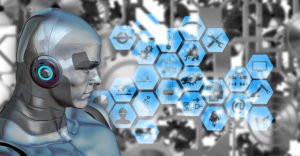 Indian Prime Minister Narendra Modi’s second term included several initiatives developed to drive cutting-edge technologies forward the market. For example, the Interim Budget 2019 established a national plan for the advancement of emerging technologies, such as robotics, artificial intelligence (AI), the internet-of-things (IoT), and others.
Indian Prime Minister Narendra Modi’s second term included several initiatives developed to drive cutting-edge technologies forward the market. For example, the Interim Budget 2019 established a national plan for the advancement of emerging technologies, such as robotics, artificial intelligence (AI), the internet-of-things (IoT), and others.
To this end, NITI Aayog — a policy think tank of the Indian Government — has been at the forefront of researching new-age technologies for bettering government assistance.
Here’s a look at the top five AI collaborations of 2019 that took place between the Government of India and the top tech conglomerates.
1. Google. In September 2019, Google hosted the fifth edition of its annual “Google for India” event in New Delhi, which highlights new product releases and initiatives in the country. One of the major announcements was the expansion of Google’s free WiFi program. The tech giant said it partnered with BSNL to provide high-speed, reliable, and secure public WiFi to villages in Bihar, Gujarat, and Maharashtra. BSNL, or Bharat Sanchar Nigam Limited, is an Indian state-owned telecommunications company.
Google also said it plans to launch new products and initiatives that are designed specifically for the Indian users, including support for Indic languages on platforms such as Search, Lens, and Bolo.
Other announcements at the event included a new AI-based lab, which will be built in India, and a statement of intent with the Ministry of Electronics and IT (MeitY). Google and MeitY are working on the “Build for Digital India” program, which will offer engineering students a platform to develop market-ready, technology-based solutions to address key social problems in the country.
Google has also formed a partnership with the Indian Central Water Commission (CWC) to forecast floods. This will be done by real-time river measurements of the water levels hourly in over a thousand stream gauges across the country.
2. Adobe. In 2019, NITI Aayog’s Atal Innovation Mission (AIM) signed a statement of intent with Adobe to focus on spreading digital literacy in all Atal Tinkering Labs in India. According to the SoI, Adobe will be choosing 100 schools under Atal Tinkering Labs (ATL) drive and the company will provide free licenses of Adobe Spark award to ATLs.
Additionally, Adobe will implement its Digital Disha Program in ATLs under which free licenses of Adobe Spark premium shall be offered to ATLs. The Adobe Digital Disha Programme is aimed at driving creative thinking and technology-based learning. Under this collaboration with AIM, students and teachers can benefit from creative learning resources, empowering them with new-age skills to thrive in the current digital era and preparing them for long term success.
3. Microsoft. Microsoft published the Digital Governance Tech Tour in August 2019. This is a national program designed to deliver critical AI and intelligent cloud computing skills to government officials in charge of IT across the country. The initiative involves a series of physical and virtual workshops, with plans to train 5,000 professionals over a 12-month term.
The Digital Governance Tech Tour will be open to technocrats and IT experts in government, including operators of the public sector, government allies, and system integrators.
As India advances toward fulfilling its vision of becoming a $5 trillion economy, applying AI and data analytics using secure and compliant cloud-based tools can ensure a more secure inter-departmental and cross-agency collaboration.
Through this program, Microsoft said it will help upskill government officials by: “Equipping them with the digital skills and experience needed today and in the future to successfully deploy cloud-based solutions.”
4. ABB. After confirming a statement of intent in 2018, NITI Aayog joined forces with ABB in 2019 to establish a workshop that supports the MSMEs in its digitalization efforts. The program focused on how the Indian economy can be digitized with the cooperation of emerging technologies like big data, AI, and digital connectivity.
Entrepreneurs, state government functionaries, policymakers, and technology experts from selected sectors of textiles, pharmaceuticals, electrical and electronics, food processing, and manufacturing took part to discuss, learn, and analyze the potential impacts of automation and AI on the workforce. The attendees also discussed the actions that could be taken to teach, train, and up-skill the workforce.
5. IBM. The Ministry of Agriculture and Farmers Welfare in India confirmed the undertaking of a pilot study with IBM India in three districts (Rajkot, Bhopal, and Nanded) in the states of Gujarat, Madhya Pradesh, and Maharashtra.
The study aims to create a digital solution for farmers in the field of agriculture through AI and the latest climate-related technology. Ideally, it will provide advanced weather forecasts and soil moisture information on a pro bono basis to help farmers make better crop management decisions to increase productivity.
Filed Under: ARM., Blog entry, Tech Articles


Questions related to this article?
👉Ask and discuss on Electro-Tech-Online.com and EDAboard.com forums.
Tell Us What You Think!!
You must be logged in to post a comment.